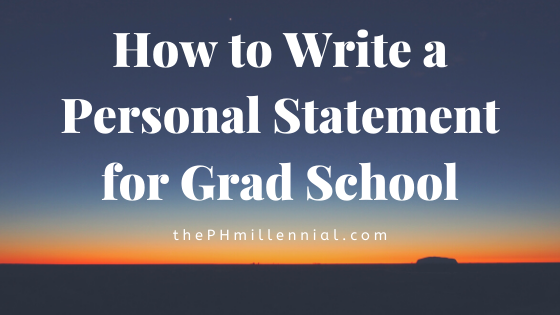Writing a personal statement for grad school is an essential part of your grad school application.
The personal statement is the perfect time to tell the admissions committee your personal story.
As I stated in my last article: How to Write a Resume to Get Into Grad School, the 5 main factors that go into graduate school applications are:
- Undergraduate Transcripts
- Resume
- Personal Statement
- Test Scores (GRE, etc.)
- Letters of Recommendations
The personal statement is your time to separate yourself from other applicants.
Remember application committees are regular people (besides the fact your graduate school future is in their hands ahhh) so you want to make yourself personable.
From how you write your personal statement to what you write about is going to be important for creating a personal statement that will get you into graduate school.
Support The Public Health Millennial on BuyMeACoffee
This article is broken into the following sections:
- What is a Personal Statement
- Questions to Brainstorm Writing Ideas
- How to Write a Good Personal Statement with an overview and showing what each paragraph should contain.
- What Not to Do
- Pro Tips
- Conclusion
What is a Personal Statement
Simply put a personal statement is a way of selling yourself to the admission committee. Or telling your personal story to the admission committee.
You’ll need to show 3 main things:
- Giving them a reason to believe you deserve to be admitted
- Showing them how you will be successful in the program
- Highlighting how getting into the program will assist you in achieving your larger goals
Personal statements are usually 1 to 2 pages in length. Schools may give you a prompt to respond to, but often times they do not.
In the graduate school application process, personal statements are an important part of getting accepted into the program your choosing.
Yes, your GPA, test scores, and letters of recommendation are important, but your personal statement can be the deciding factor that makes or breaks your application.

Questions to Brainstorm Writing Ideas
Coming up with ideas to start your personal statement can be daunting. I know for many students it will take at least 2-4 weeks to write and re-write their personal statement until it is of a high quality.
That being said, here are some good questions to ask yourself (and write down your thoughts) to have ideas of things to write about in your personal statement.
- Why do you want to study in this field?
- Why you want to study at the specific program or school?
- What sparked your interest in this field of study?
- What experience do you have? First hand, Second hand and Volunteerism.
- Which skills are needed for this program and how have you attained them?
- Which techniques, methods, or programming skills are needed and how have you attained them?
- What do you expect to learn from the program and what you expect to get out of it?
- What are your future goals and how will this program help you to reach them?
Some additional brainstorming questions can be seen at the Purdue Writing Lab.
After your brainstorm and answer the previous questions, you should be set to start writing your personal statement.
How to Write a Good Personal Statement
Writing a good personal statement comes down to many factors. And there is not a singular definition of a good personal statement, however good personal statements tend to have similar qualities.
During your writing process, you will want to at least do a little research into each school or program you are applying to.
This is important because you will need to tailor every personal statement to the program you are applying to.
In tailoring your personal statement you are going to want to know specific information pertaining to the program that you can align with your interest. This will make it easier for you to write a strong personal statement.
It will also be essential that you have a clear narrative when writing.
You are only given a maximum of 2 pages, so you want to have a clear and concise story that you want to tell. Additionally, you will want to ensure that your personal statement contains strong writing.
This is important because during grad school you will be doing a lot of research papers and other writing projects so the admission committee is going to want to see great written communication skills.
Also you will want to show that you are a good fit for the specific program you are applying to.
This goes back to the idea of tailoring each personal statement to the specific program. When you do this, naturally you will show the how you are a good fit for the program.
Another important aspect of having a good personal statement will be that you don’t write what you did, but rather you write what you learnt from doing what you did.
For example:
Instead of saying:
- I learnt how to use R in my biostatistics class for robust data analysis.
You should say:
- By using R to analyze bull sharks spawning location data, I learnt how to aggregate data from various sources and run a 2-way ANOVA statistical test to find the mean differences between the bull shark populations.
When writing your graduate school personal statements you should think of your essay as a hour-glass. In the sense that you start off and end broad in your introduction and conclusion, but have more specific information throughout your body paragraphs.
Lastly, you will want to be following the instructions and word limits given by the specific schools that you are applying to.
Some schools will have specific requirements or instructions when writing your personal statement and therefore it will be important to know of these before putting pen to paper.
Overview
A easy to follow format for your personal statement will be by breaking it into 5 paragraphs, which include:
- Introduction (Paragraph 1)
- Body (Paragraph 2-4)
- Conclusion (Paragraph 5)
Next I’ll go into what you can add to each section of your personal statement.
Additionally, you can frame your essay in the same order as the brainstorming questions I stated earlier.
Introduction (First Paragraph)
You will want to start the essay off by sparking the admission committee’s interest. This could be done by using anecdotes or other captivating writing techniques.
If you don’t have any clever anecdotes then perhaps talk about:
- Why do you want to study in this field?
- Why you want to study at the specific program or school?
- What sparked your interest in this field of study?
Remember that you have limited space so only include information that is relevant and frame your entire essay around 1 or 2 main themes.
Second Paragraph
What have you done that makes you suitable for this program. Start with your strongest point first.
This paragraph is all about showing the admission committee why you would be a good fit for the program. You will want to include an or a couple of examples on how you have engaged with the field during undergraduate or in other capacities.
Also you can add compliments to something specific about their program.
ALTERNATIVELY
You could start this paragraph highlighting some cool points (from the research you did) about the program and why you think they are cool and how it fits in with your interest or your graduate school plan.
So this can be special things that interest you related to perhaps, a faculty member and their research, a specific program concentration, or a cool and unique feature of their university or more specifically program.
Third Paragraph
This paragraph can be used to highlight specific skills/techniques/methods you’ve learned that you think will prove that you will be successful once you are accepted into the program.
Think about writing what you learnt from what you did rather than just what you did. This will ensure that the admission committee can see what value you have gained previously and how this can translate into success in their program.
Fourth Paragraph
The fourth paragraph can be used to show “what else have you have done.”
This can be more of things less related to the field but shows transferable skills and experiences that can be used during your graduate program.
Think public speaking, or an influential volunteering experience. You will still want to ensure that you are choosing aspects that will show that you are an interesting individual and well-rounded applicant.
Conclusion (Last Paragraph)
Since this is your last paragraph, you are going to want to restate the major points and theme of your essay while not summarizing your essay.
In the conclusion its a good idea to place your experience and getting into the program in a frame that shows how this will help you to succeed and achieve your larger goals. You will also want to ensure you are saying how being accepted will help you to take the next step in your career.
What Not to Do
Some absolute don’t for your personal statement are:
Don’t be Cliche
I think this should go without me having to say anything. You don’t want to be vague and say something like:
“Public Health is an important field because I can help people.”
I think that I vague and completely obvious so leave statements like this out of your personal statement.
Don’t make Excuses
You don’t want to write to make excuses for what the admission committee can see in the remainder or your application. If you are going to use weak points then you have to ensure that you are using it to highlight something you learnt or how you overcame the issue.
Making excuses doesn’t do anything positive for you and therefore should be left out of your personal statement.
Don’t be Arrogant
You don’t want to come off as arrogant in your personal statement. You don’t want to boast too much, but a little thoughtful and strategic boasting can definitely bolster your overall application.
Know that you want to highlight your strengths without coming across as obnoxious.
Don’t state or allude to this program is your back-up plan
This is the last thing you want to include in your personal statement. Never, I repeat, never state or allude that this is just your back-up plan.
The admission committee is going to consist of people who are passionate about the work they do and the institution they work at. So it goes without saying that if you refer to their school as only good for your backup, they are sure to take that in an insulting way and are more likely to not accept you into their program.
And this means if you actually don’t get into the schools you want then, you are going to have a fighting chance to get into the school’s you saw as your “back-up.”

Pro Tips
Reflect
It’s not everyday someone ask you to write an essay about yourself. It can be something very hard to do since we don’t truly look at our lives from the outside and write about it.
This is why it is important to reflect and actually realize what you are trying to accomplish and understand what are your underlying motivations for wanting to go to graduate school.
Think about things like:
- How am I a strong applicant?
- What makes you special?
- What influences you and your goals?
Try to Connect with Reader
The admission committee are people. What kind of people? Well they are people interested in the field of study you are applying to and that field maybe has some generalizable traits that people share.
So use this to visualize what perspective the person reading your personal statement will be viewing it from so that you can write a more sincere and connecting essay.
Lots of Drafts and Revisions
Graduate school may be your dream or it may help you to achieve your dream. Either way you really do want to get accepted. Therefore you should give yourself ample time to write your personal statement.
I wrote and re-wrote my personal statement maybe 4 times and this is not with others feedback as yet. It will be important that you are creating a personal statement that you are proud of and will feel confident when you apply.
Drafts and revisions will help to get your very polished ideas out onto the paper.
Get Others Opinions and Feedback
You are going to want a second and third pair of eyes reading over your personal statement multiple times. We are biased in our writing and may miss grammatical or other mistakes that will hinder your personal statement from truly shining.
Have people that you know will give you constructive criticism. Asking a professor or friend in graduate school could help you really enhance your essay as they are likely to give you little insights and tweaks that will go a long way.
You can also give someone you trust your personal statement and ask them these feedback questions:
- What do you think is the overarching theme?
- Which parts do you think are the strongest? And which are the weakest? WHY?
- Do the paragraphs have logical transitions?
- How about grammar, spelling mistakes, or maybe some words you would use instead of ones I used?
- What would make the essay stronger?wr
Conclusion
There are 5 factors that come into play in your graduate school application.
These are:
- Undergraduate Transcripts
- Resume
- Personal Statement
- Test Scores (GRE, MCAT)
- Letters of Recommendation
Your personal statement can absolutely make or break your graduate school application.
Therefore you have to ensure that you are showing yourself in the best light to the admission committee.
Your personal statement is truly an essay about you that is written from your perspective.
You are going to want to provide substantive information that will show the admission committee:
- Reasons to believe you deserve to be admitted
- How you will be successful in the program
- How getting into the program will assist you in achieving your larger goals
Ensure that you are tailoring every application to each program you apply to.
Whatever you do, ensure that you have at least 2 people read over your personal statement. With so much weight given to this factor, you will need to ensure your submission does not have any silly mistakes.
Applying to graduate school can be a very exciting yet nerve-wrecking time in your life. You will want to give the most in your personal statement to show that you are committed and want to be accepted into their program.
What has been a challenge for you writing your personal statement?



